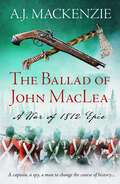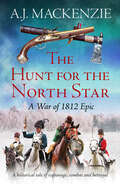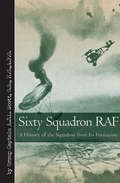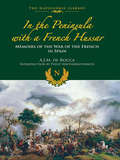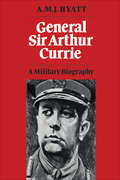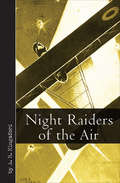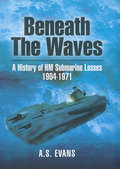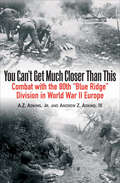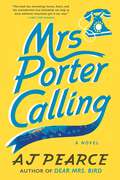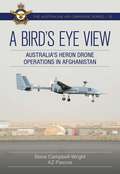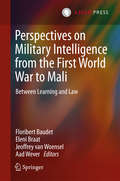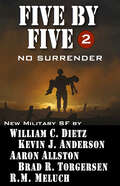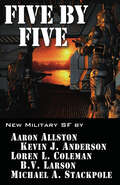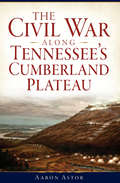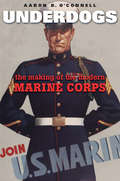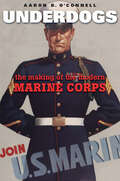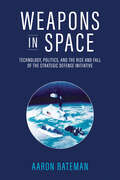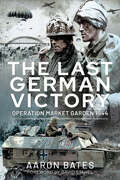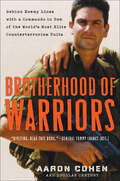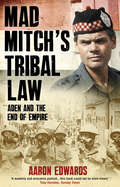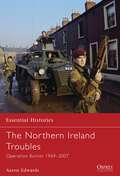- Table View
- List View
The Ballad of John MacLea (The War of 1812 Epics)
by A.J. MacKenzieA ring of spies, a battle of lies, and one man who can change the tide of war. The first War of 1812 Epic from the author of The Hunt for the North Star. Stationed with British militia in Upper Canada in late 1812, Captain John MacLea is charting his own course against a background of uncertain loyalties and certain danger. Tasked with routing out enemy agents and thwarting an elaborate espionage ring, MacLea soon discovers that there is a traitor in their ranks, organizing a devastating plot. Events spiral out of control, culminating in a dramatic showdown aboard a captured American warship headed for the breach at Niagara Falls. Failure may mean the loss of the war . . . failure is not an option. Gripping, compelling, and anchored in detailed historical research, The Ballad of John MacLea is a triumph, perfect for fans of Adrian Goldsworthy, Iain Gale and Bernard Cornwell. Praise for the novels of A. J. MacKenzie &“Unputdownable . . . I was blown away.&” —Angus Donald, international bestselling author of the Outlaw Chronicles &“Truly enthralling.&” —Paul Doherty, author of Dark Queen Wary &“A rip-roaring story and devilish plot with outstanding historical detail.&” —C. B. Hanley, author of the Mediaeval Mysteries series
The Hunt for the North Star (The War of 1812 Epics)
by A.J. MacKenzieNo one is safe and everyone is a suspect in this action-packed, suspenseful, meticulously researched sequel to the historical thriller The Ballad of John MacLea. Fresh from his success at the Battle of Queenston, war hero John MacLea is thrown straight back into the maelstrom of tactical espionage. American master spy Polaris has so far evaded capture, and the longer he remains at large the more dangerous he becomes to the allied British and Canadian forces. John travels to York, capital of Upper Canada, deep into a sinister world of treachery, where secrets and lies are an everyday currency. He must discover the identity of Polaris, for a deadly plot is brewing, one that may signal total defeat for the allied troops. Failure is not an option . . .
Sixty Squadron RAF: A History of the Squadron from Its Formation (Vintage Aviation Library)
by A.J.L. ScottThis candid WWI memoir takes readers inside the cockpit with an RAF officer on the Western Front from the outbreak the Great War until its end in 1918.Louis Arbon Strange was at the Royal Air Force’s Central Flying School when war broke out in 1914. He immediately reported to Royal Flying Corps headquarters and joined No.5 Squadron. Strage remained on active duty throughout the war, serving his country over the Western Front from August of that year until the enemy’s surrender.Strange transferred to No.6 Squadron in 1915 and went on to form and command No.23 Squadron. Due to illness, he did not accompany his Squadron to France, but spent that time training others. He took charge of the Machine-Gun School at Hythe and other schools of aerial gunnery before returning to the Front. There he commanded the 23rd Wing, and finally took command of the 80th Wing from June 1918 until the end of the war. As Strange chronicles his experiences, he provides unique insight into how and why the Allied airmen eventually prevailed.
In the Peninsula with a French Hussar: Memoirs of the War of the French in Spain (The Napoleonic Library)
by A.J.M. de RoccaAlbert Jean Michel de Rocca gives a riveting account of the Peninsular War from an entirely different perspective. Albert Rocca was a junior officer in Napoleon's 2nd Regiment of Hussars, and describes such early events as the march to Madrid and Napoleons entry into the city, followed by the subsequent battles and the pursuit of Sir John Moore to Corunna. For him Spain was not just alien but totally hostile as well. Where British chroniclers of the Peninsular berate the qualities of the Spanish armies Rocca knew that his life was constantly under threat from not only the enemy armies but also from a population who would kill an unwary or isolated Frenchman in a moment. The Peninsular War was a bitter struggle by the Spaniards to liberate their country from the French invaders and in this essential memoir Albert de Rocca describes the fighting in uncompromising detail.
The Long Flight Home: a heart-breaking and uplifting World War 2 love story
by A.L. HladA heart-breaking and moving story of love and sacrifice, set against the backdrop of the Blitz. Inspired by true events, and perfect for readers of The Tattooist of Auschwitz, The Guernsey Literary and Potato Peel Pie Society and Dear Mrs Bird***Is love strong enough to survive a war?September 1940. As enemy fighter planes blacken the sky, Susan Shepherd finds comfort at her home in Epping Forest, where she and her grandfather raise homing pigeons. Of all Susan's birds, it's Duchess who is the most extraordinary, and the two share a special bond. Thousands of miles away, Ollie Evans, a young American pilot decides to travel to Britain to join the Royal Air Force. But Ollie doesn't expect his quest to bring him instead to the National Pigeon Service - a covert new operation involving homing pigeons - and to Susan. The National Pigeon Service has a dangerous mission to air-drop hundreds of pigeons into German-occupied France. Despite their growing friendship Ollie and Susan must soon be parted - but will Duchess's devotion and sense of duty prove to be an unexpected lifeline between them?Based on true events, The Long Flight Home is an uplifting and timeless wartime novel, that reminds us how, in times of hardship, hope is never truly lost.
General Sir Arthur Currie: A Military Biography (Canadian War Museum Historical Publication #no. 22)
by A.M.J. HyattThe most important Canadian in the First World War, Arthur Currie was an extraordinary successful field commander in a war that produced few successful generals. In this biography A.M.J. Hyatt recalls the military career of a remarkable man.<P><P> Currie's achievements were realized in spite of some formidable obstacles. He was not a professional soldier, having been a civilian before the war. He entered the war under the shadow of a scandal, which, had it been disclosed at the time, would certainly have brought public disgrace. He was not a charismatic man; he had none of the personal flair of so many successful military leaders. In many ways these apparently negative factors make his story all the more remarkable, the secret of his success the more intriguing. That secret, as Hyatt explains, was a fine sense of tactics: Currie, the 'amateur' soldier, had all the instincts of a dedicated professional, and he used them to minimize the destruction of the young Canadian troops under his command.<P> When the war was over Currie returned to civilian life, and was knighted for his service. This biography offers the first balanced account of a central figure in Canadian military history.
Night Raiders of the Air: Being The Experiences Of A Night Flying Pilot, Who Raided Hunland On Many Dark Nights During The War (Vintage Aviation Library #Vol. 20)
by A.R. KingsfordA WWI pilot’s memoir of flying with the unit that dropped the first bomb at night on Germany—and, on November 11, 1918, the last one.One of the many who came to Europe from all over the British Commonwealth to fight in the First World War, A. R. Kingsford had sailed from New Zealand in 1914. He joined the Royal Flying Corps in 1917 and learned to fly at Northolt before being posted to 33 Squadron at Lincoln, where he flew against Zeppelins sent from across the North Sea on night bombing raids. Kingsford joined 100 Squadron in France early in 1918 and had an active career with this famous squadron up until the end of the war.Full of adventure, Night Raiders of the Air is a first-person account of this young volunteer’s experiences during the Great War—a fascinating read for anyone interested in the early days of military aviation.
Beneath the Waves: A History of HM Submarine Losses, 1904–1971
by A.S. EvansSince the beginning of the Royal Navy Submarine Service in 1901, 173 submarines have been lost and in many circumstances with their entire crew. War inevitably takes a heavy toll: in World War Two alone 341 officer and 2,801 ratings failed to return to harbour. The loss of personnel was roughly equivalent to the strength of the Submarine Arm at the outbreak of war.Between the first loss, A1 in 1904, and the last, Artemis in 1971, lie many stories in which cool nerve was very much in evidence and one can marvel at the escape of the only survivor of Perseus; and of the sinking of Olympus from which the few survivors had to swim seven miles before receiving help; and of Surgeon-Lieutenant Charles Rhodes who died that others may live. These and many other accounts of submarine escape are described within this history and whenever possible in the words of survivors or witnesses.
You Can't Get Much Closer Than This: Combat With the 80th "Blue Ridge" Division in World War II Europe
by A.Z. Adkins Jr. Andrew Z. Adkins IIIA young soldier’s memoirs of fighting in WWII: “Fascinating . . . A personal record like this is a valuable resource to anyone interested in the period”(Military Model Scene).After the Citadel and Officer Candidate School, Andrew Z. Adkins Jr., was sent to the 80th Infantry Division, then training in the California-Arizona desert. There, he was assigned as an 81mm mortar section leader in Company H, 2nd Battalion, 317th Infantry Regiment.When the division completed training in December 1943, it was shipped in stages to the United Kingdom and then Normandy, where it landed on August 3, 1944. Lieutenant Adkins and his fellow soldiers took part in light hedgerow fighting that served to shake the division down and familiarize the troops and their officers with combat. The first real test came within weeks, when the 2nd Battalion, 317th Infantry, attacked high ground near Argentan during the drive to seal German forces in the Falaise Pocket. While scouting for mortar positions in the woods, Adkins met a group of Germans and shot one of them dead with his carbine. This baptism in blood settled the question faced by every novice combatant: He was cool under fire, capable of killing when facing the enemy. He later wrote, “It was a sickening sight, but having been caught up in the heat of battle, I didn’t have a reaction other than feeling I had saved my own life.”Thereafter, the 2nd Battalion, 317th Infantry, took part in bloody battles across France, sometimes coping with inept leadership and grievous losses, even as it took hills and towns away from the Germans. In the fighting graphically portrayed here, Adkins acted with skill and courage, placing himself at the forefront of the action whenever he could. His extremely aggressive delivery of critical supplies to a cut-off unit in an embattled French town earned him a Bronze Star, the first in his battalion.This is a story of a young soldier at war, a junior officer’s coming of age amid pulse-pounding combat. Before his death, Andy Adkins was able to face his memory of war as bravely as he faced war itself. He put it on paper, honest and unflinching. In 1944-45, he did his duty to his men and country—and here, he serves new generations of military and civilian readers.
Mrs. Porter Calling: A Novel (The Emmy Lake Chronicles #3)
by AJ PearceFrom the author of the bestselling &“jaunty, heartbreaking winner&” (People) Dear Mrs. Bird, a charming and irresistible novel featuring aspiring journalist Emmy Lake as she navigates life, love, and friendship in London during World War II—perfect for fans of The Paris Library and Lessons in Chemistry.London, April 1943. Twenty-five-year-old Emmy Lake is doing her part for the war effort by spearheading the hugely popular &“Yours Cheerfully&” advice column in Woman&’s Friend magazine. The postbags are full, Emmy&’s guidance offers much needed support to her readers, and Woman&’s Friend is thriving. Cheered on by her best friends Bunty and Thelma, and resolute in the absence of her husband who is fighting in the army, Emmy is dedicated to helping women face the increasing challenges brought about by over three years of war. But Emmy&’s world is turned upside down when glamorous socialite, the Honorable Cressida Porter, becomes the new publisher of the magazine, and wants to change everything about it. Aided by Mrs. Pye, a Paris-obsessed editor with delusions of grandeur, and Small Winston, the grumpiest dog in London, Mrs. Porter fills the pages with expensive fashions and frivolous articles about her friends. Worst of all, she announces that she is cutting the advice column. Her vision for the publication&’s future is dreadful and Emmy is determined to fight back. Emmy and her friends must save the magazine they love, but when personal tragedy strikes, they are forced to face the very real implications of life in war-torn London. Set in 1943 but inherently resonant with how we live today, Pearce&’s signature blend of laugh-out-loud funny and heartbreakingly sad storytelling delivers a tribute to the strength of friendships. An enriching story about women coming together, Pearce&’s latest novel is the perfect tonic for our times.
Yours Cheerfully: A Novel (The Emmy Lake Chronicles #2)
by AJ PearceFrom the author of the &“jaunty, heartbreaking winner&” (People) and international bestseller Dear Mrs. Bird comes a charming and uplifting novel set in London during World War II about a plucky young journalist and her adventures as wartime advice columnist.London, November 1941. Following the departure of the formidable Henrietta Bird from Woman&’s Friend magazine, things are looking up for Emmeline Lake as she takes on the new challenges as a wartime advice columnist. Her relationship with boyfriend Charles is blossoming, while Emmy&’s best friend Bunty, still reeling from the very worst of the Blitz, is bravely looking to the future. Together, the friends are determined to Make a Go of It. When the Ministry of Information calls on Britain&’s women&’s magazines to help recruit female workers to the war effort, Emmy is thrilled to step up and help. But when she and Bunty meet a young mother who shows them the very real challenges that women war workers face, Emmy must confront a dilemma between doing her duty and standing by her friends. As funny, heartwarming, and touching as Dear Mrs. Bird, Yours Cheerfully is an endearing portrait of female friendship and &“a fruitful exploration of the solidarity among women in times of grief, love, and hardship&” (Publishers Weekly).
A Bird's Eye View: Australia's Heron Drone Operations in Afghanistan
by Steve Campbell-Wright AZ PascoeThe Royal Australian Air Force&’s Heron unmanned aerial vehicle (UAV) was a critical asset in the fight against terrorism and insurgency in Afghanistan. From 2009 to 2014, the Heron detachment provided intelligence, surveillance and reconnaissance (ISR) support to Australian and Coalition forces on the ground, contributing to the mission&’s success and helping to keep our soldiers safe. A Bird&’s Eye View provides an in-depth look at the RAAF Heron detachment&’s operations in Afghanistan, offering a rare glimpse into the world of UAV operations in a complex and challenging environment. It provides a detailed account of the Heron&’s capabilities, the challenges faced by the detachment and the contributions made by the men and women who served in this vital role. Through the personal accounts of those who served in the Heron integrated project team and the Heron detachment, readers will better understand the impact of the Heron UAV on the mission in Afghanistan. They will also gain insights into the unique challenges faced by those who operate UAVs and their critical role in modern warfare.A Bird&’s Eye View is a tribute to the courage, dedication and professionalism of the RAAF Heron detachment and a testament to the enduring spirit of the Australian Defence Force. It is a must-read for anyone interested in the history of the RAAF, the role of UAVs in modern warfare and the sacrifices made by our men and women in uniform.
Perspectives on Military Intelligence from the First World War to Mali
by Floribert Baudet Eleni Braat Jeoffrey Woensel Aad WeverMany intelligence practitioners feel that the statutory footing on which intelligence agencies have been placed forms an impediment to confronting unprecedented contemporary challenges. On the basis of case studies spanning the period from the First World War to the present, this book argues that while the intelligence community in the era of globalization has indeed come to face new and complex challenges that require adaptation, operating in demanding and changing environments is not new at all. This book questions the conventional wisdom of 9/11 or the end of the Cold War as caesurae. It also argues that the ability to adapt, innovate, question and learn from past experience is crucial for the success of intelligence organizations, rather than ever-expanding funding. Agencies' ability to reflect, adapt and learn from experience determines their subsequent capability to deliver. One key development resulting from globalization is the marked increase in cooperation between intelligence agencies of different countries on the one hand, and between investigative agencies and intelligence agencies on the other. This has led to concerns over human rights and privacy and to increased calls for accountability and improved oversight as the increase in cooperation between organizations operating globally also provides scope for the circumvention of domestic restrictions. This book proposes an instrument to assess the effectiveness of existing accountability arrangements and offers new insights into the role of (military) intelligence in a number of crises, e. g. , the 1962 Cold War confrontation over Western New Guinea, and the functioning of intelligence in peacekeeping operations ranging from Srebrenica to Mali. Thematically comprehensive, it offers a mixture of historical, legal, operational, and policy aspects, analyzed through the lens of institutional learning, bringing together academic and practitioners' perspectives. The focus lies not only on the familiar Anglo-Saxon experience but also on cases from India, the Netherlands, South East Asia, Bosnia, Lebanon, and Mali. The book is aimed at both scholars and practitioners studying and/or working in the field of civil and military intelligence, and those involved in international relations and international humanitarian law/human rights law. It brings together contributions from authors who spoke at the Conference to commemorate the 100th anniversary of the Dutch Military Intelligence and Security Service, organized by the Netherlands Intelligence Studies Association (NISA), and from a number of authors who were specifically invited to participate.
Five by Five: No Surrender
by Kevin J. Anderson Aaron Allston William C. Dietz Brad R. Torgersen R M MeluchFive by Five: No Surrender is the second collection in the series of short novels by five masters of military science fiction. In these pulse-pounding tales, the best (or worst) soldiers in the galaxy are pitted against powerful aliens on distant battlefields. In William C. Dietz&’s Legion of the Damned® story, Legio Patria Nostra, the insectoid Ramanthians have occupied Earth, and the Confederacy of Sentient Beings turn to the xenophobic Hudathans for help. But Hudathan relics have been stolen by ex-legionnaire thieves—and the Hudathans won't join the Confederacy unless Legion Captain Deacon Smith can get them back. Set in the world of Harlan Ellison&’s classic Outer Limits episode &“Soldier,&” Kevin J. Anderson&’s Prisoner of War follows a set of warriors in a never-ending future war, men bred for nothing but the battleground, and how they cope with the horrors of peace. When expensive, classified shipments of military hardware go missing, Conflux Armed Forces policewoman Kalliope Reardon follows the trail far outside the boundaries of the civilized galaxy, and into the heart of occupied enemy territory in Brad R. Torgersen&’s Reardon&’s Law. When A. C. Cade was exposed as a fraud, Cade&’s son makes himself into the elite father pilot he believed his father was, defending Earth against a desperate alien invader which has no use for humankind and absolutely nothing to lose in Dagger Team Seven by R. M. Meluch. In Coffee Black Sea, the saga of the Dollgangers from Aaron Allston&’s Big Plush (Five by Five Vol. 1) continues. Bow, BeeBee, Lina, and new &’gangers escalate the risks of their quest for survival . . . by turning their eyes to the stars.
Five by Five: No Surrender
by Aaron Allston Loren Coleman Michael A Stackpole Kevin J Anderson B. V. LarsonFace aliens, monsters, and more in these five short novels by five masters of military science fiction. It&’s a war out there . . . In these pulse-pounding tales, the best (or worst) soldiers in the galaxy are pitted against powerful aliens on distant battlefields. Never before published stories about monsters, deadly combat tech, treachery, and honor: Big Plush by Aaron Allston (a novella from the Action Figures series)—The Dollgangers, artificial people made in mankind&’s image, take up arms in a desperate bid to win their freedom. Comrades in Arms by Kevin J. Anderson—A damaged cyborg soldier and an enemy alien fighter turn their backs on the war and try to escape. But the human and alien governments can&’t tolerate the two deserters working together, so they join forces to hunt them down. Shores of the Infinite by Loren L. Coleman (a novella from the ICAS File series)—Separated from command & control, Combat Assault Suit troopers force a beachhead to liberate a new planet from the cyborg threat. The Black Ship by B.V. Larson (a mech novella from the Imperium Series)—A human settlement on the deadliest planet ever colonized clings to life . . . but today new invaders are coming down from the stars. Out There by Michael A. Stackpole—The Qian have discovered humanity and welcomed them into their star-spanning empire. The benefits they offer humanity are many, and they don&’t want much in return: just the best human pilots available to take apart a most diabolical enemy.
Civil War along Tennessee's Cumberland Plateau, The (Civil War Series)
by Aaron AstorTennessee's Cumberland Plateau played host to some of the most dramatic military maneuvering of the Civil War. Straddling the entire state of Tennessee, the formidable tableland proved to be a maze of topographical pitfalls and a morass of divided loyalties. As Federal forces sought to capitalize on the capture of Nashville, they moved into a region split by the most vicious guerrilla warfare outside Missouri, including the colorful and intensely violent rivalry between Confederate Champ Ferguson and Unionist "Tinker" Dave Beaty. The bitter conflict affected thousands of ordinary men and women struggling to survive in the face of a remorseless war of attrition, and its legacy continues to be felt today.
Our Latest Longest War: Losing Hearts and Minds in Afghanistan
by Aaron B. O'ConnellThe first rule of warfare is to know one’s enemy. The second is to know thyself. More than fifteen years and three quarters of a trillion dollars after the US invasion of Afghanistan, it’s clear that the United States followed neither rule well. America’s goals in Afghanistan were lofty to begin with: dismantle al Qaeda, remove the Taliban from power, remake the country into a democracy. But not only did the mission come completely unmoored from reality, the United States wasted billions of dollars, and thousands of lives were lost. Our Latest Longest War is a chronicle of how, why, and in what ways the war in Afghanistan failed. Edited by historian and Marine lieutenant colonel Aaron B. O’Connell, the essays collected here represent nine different perspectives on the war—all from veterans of the conflict, both American and Afghan. Together, they paint a picture of a war in which problems of culture and an unbridgeable rural-urban divide derailed nearly every field of endeavor. The authors also draw troubling parallels to the Vietnam War, arguing that deep-running ideological currents in American life explain why the US government has repeatedly used armed nation-building to try to transform failing states into modern, liberal democracies. In Afghanistan, as in Vietnam, this created a dramatic mismatch of means and ends that neither money, technology, nor the force of arms could overcome. The war in Afghanistan has been the longest in US history, and in many ways, the most confounding. Few who fought in it think it has been worthwhile. These are difficult topics for any American or Afghan to consider, especially those who lost friends or family in it. This sobering history—written by the very people who have been fighting the war—is impossible to ignore.
Underdogs
by Aaron B. O'ConnellThe Marine Corps has always considered itself a breed apart. Since 1775, Americaâs smallest armed service has been suspicious of outsiders and deeply loyal to its traditions. Marines believe in nothing more strongly than the Corpsâ uniqueness and superiority, and this undying faith in its own exceptionalism is what has made the Marines one of the sharpest, swiftest tools of American military power. Along with unapologetic self-promotion, a strong sense of identity has enabled the Corps to exert a powerful influence on American politics and culture. Aaron OâConnell focuses on the period from World War II to Vietnam, when the Marine Corps transformed itself from Americaâs least respected to its most elite armed force. He describes how the distinctive Marine culture played a role in this ascendancy. Venerating sacrifice and suffering, privileging the collective over the individual, Corps culture was saturated with romantic and religious overtones that had enormous marketing potential in a postwar America energized by new global responsibilities. Capitalizing on this, the Marines curried the favor of the nationâs best reporters, befriended publishers, courted Hollywood and Congress, and built a public relations infrastructure that would eventually brand it as the most prestigious military service in America. But the Corpsâ triumphs did not come without costs, and OâConnell writes of those, too, including a culture of violence that sometimes spread beyond the battlefield. And as he considers how the Corpsâ interventions in American politics have ushered in a more militarized approach to national security, OâConnell questions its sustainability.
Underdogs: The Making of the Modern Marine Corps
by Aaron B. O'ConnellExploring the growth of the Marines from disadvantaged to elite force, this history “offers an excellent analysis of how the marines became the Marines.” (Publishers Weekly)The Marine Corps has always considered itself a breed apart. This undying faith in its own exceptionalism is what has made the Marines one of the sharpest, swiftest tools of American military power. Aaron O’Connell focuses on the period from World War II to Vietnam, when the Marine Corps transformed itself from America’s least respected to its most elite armed force. Venerating sacrifice and suffering, privileging the collective over the individual, Corps culture was saturated with romantic and religious overtones that had enormous marketing potential in a postwar America energized by new global responsibilities. Capitalizing on this, the Marines curried the favor of the nation’s best reporters, befriended publishers, courted Hollywood and Congress, and built a public relations infrastructure that would eventually brand it as the most prestigious military service in America.But as O’Connell suggests, the Corps’ triumphs did not come without costs, including a culture of violence that sometimes spread beyond the battlefield. “A significant and original contribution to both the military history of the Cold War and the ongoing conversation about the militarization of American culture.” —Beth Bailey, author of America's Army: Making the All-Volunteer Force“Takes readers inside the culture of the Corps.” —Nathaniel Fick, author of One Bullet Away: The Making of a Marine Officer“Insightful.” —Library Journal“A powerful account of the relationship between fighting war and preserving peace, viewed through the lens of the stories that built support for both.” —Kirkus Reviews “Absorbing.” —The Wall Street Journal
Weapons in Space: Technology, Politics, and the Rise and Fall of the Strategic Defense Initiative
by Aaron BatemanA new and provocative take on the formerly classified history of accelerating superpower military competition in space in the late Cold War and beyond.In March 1983, President Ronald Reagan shocked the world when he established the Strategic Defense Initiative (SDI), derisively known as &“Star Wars,&” a space-based missile defense program that aimed to protect the US from nuclear attack. In Weapons in Space, Aaron Bateman draws from recently declassified American, European, and Soviet documents to give an insightful account of SDI, situating it within a new phase in the militarization of space after the superpower détente fell apart in the 1970s. In doing so, Bateman reveals the largely secret role of military space technologies in late–Cold War US defense strategy and foreign relations.In contrast to existing narratives, Weapons in Space shows how tension over the role of military space technologies in American statecraft was a central source of SDI&’s controversy, even more so than questions of technical feasibility. By detailing the participation of Western European countries in SDI research and development, Bateman reframes space militarization in the 1970s and 1980s as an international phenomenon. He further reveals that even though SDI did not come to fruition, it obstructed diplomatic efforts to create new arms control limits in space. Consequently, Weapons in Space carries the legacy of SDI into the post–Cold War era and shows how this controversial program continues to shape the global discourse about instability in space—and the growing anxieties about a twenty-first-century space arms race.
The Last German Victory: Operation Market Garden, 1944
by Aaron BatesOperation Market Garden – the Allied airborne invasion of German-occupied Holland in September 1944 – is one of the most famous and controversial Allied failures of the Second World War. Many books have been written on the subject seeking to explain the defeat. Historians have generally focused on the mistakes made by senior commanders as they organized the operation. The choice of landing zones has been criticized, as has the structure of the airlift plan. But little attention has been paid to the influence that combat doctrine and training had upon the relative performance of the forces involved. And it is this aspect that Aaron Bates emphasizes in this perceptive, closely argued and absorbing re-evaluation of the battle. As he describes each phase of the fighting he shows how German training, which gave their units a high degree of independence of action, better equipped them to cope with the confusion created by the surprise Allied attack. In contrast, the British forces were hampered by their rigid and centralized approach which made it more difficult for them to adapt to the chaotic situation. Aaron Bates’s thought-provoking study sheds fresh light on the course of the fighting around Arnhem and should lead to a deeper understanding of one of the most remarkable episodes in the final stage of the Second World War in western Europe.
America's Arab Nationalists: From the Ottoman Revolution to the Rise of Hitler (Routledge Studies in Middle Eastern History)
by Aaron BermanAmerica’s Arab Nationalists focuses in on the relationship between Arab nationalists and Americans in the struggle for independence in an era when idealistic Americans could see the Arab nationalist struggle as an expression of their own values. In the first three decades of the twentieth century (from the 1908 Ottoman revolution to the rise of Hitler), important and influential Americans, including members of the small Arab-American community, intellectually, politically and financially participated in the construction of Arab nationalism. This book tells the story of a diverse group of people whose contributions are largely unknown to the American public. The role Americans played in the development of Arab nationalism has been largely unexplored by historians, making this an important and original contribution to scholarship. This volume is of great interest to students and academics in the field, though the narrative style is accessible to anoyone interested in Arab nationalism, the conflict between Zionists and Palestinians, and the United States’ relationship with the Arab world.
Brotherhood of Warriors: Behind Enemy Lines with a Commando in One of the World's Most Elite Counterterrorism Units
by Douglas Century Aaron CohenIn this memoir, a Canadian-American Jewish man recounts his training and service with Sayeret Duvdevan, an elite Israel Defense Forces special ops unit.At the age of 18, Aaron Cohen left Beverly Hills to prove himself in the crucible of the armed forces. He was determined to be a part of Israel’s most elite security cadre, akin to the American Green Berets and Navy SEALs. After fifteen months of grueling training designed to break down each individual man and to rebuild him as a warrior, Cohen was offered the only post a non-Israeli can hold in the special forces. In 1996 he joined a top-secret, highly controversial unit that dispatches operatives disguised as Arabs into the Palestinian-controlled West Bank to abduct terrorist leaders and bring them to Israel for interrogation and trial.Between 1996 and 1998, Aaron Cohen would learn Hebrew and Arabic; become an expert in urban counterterror warfare, the martial art of Krav Maga, and undercover operations; and participate in dozens of life-or-death missions. He would infiltrate a Hamas wedding to seize a wanted terrorist and pose as an American journalist to set a trap for one of the financiers behind the Dizengoff Massacre, taking him down in a brutal, hand-to-hand struggle. A propulsive, gripping read, Cohen’s story is a rare, fly-on-the-wall view into the shadowy world of “black ops” that redefines invincible strength, true danger, and inviolable security.
Mad Mitch's Tribal Law: Aden and the End of Empire
by Aaron EdwardsAden, 20 June 1967: two army Land Rovers burn ferociously in the midday sun. The bodies of British soldiers litter the road. Thick black smoke bellows above Crater town, home to insurgents who are fighting the British-backed Federation government. Crater had come to symbolise Arab nationalist defiance in the face of the world’s most powerful empire. Hovering 2,000 ft. above the smouldering destruction, a tiny Scout helicopter surveys the scene. Its passenger is the recently arrived Commanding Officer of the Argyll and Sutherland Highlanders, Lieutenant-Colonel Colin Mitchell. Soon the world’s media would christen him ‘Mad Mitch’, in recognition of his controversial reoccupation of Crater two weeks later.Mad Mitch was truly a man out of his time. Supremely self-confident and debonair, he was an empire builder, not dismantler, and railed against the national malaise he felt had gripped Britain’s political establishment. Drawing on a wide array of never-before-seen archival sources and eyewitness testimonies, Mad Mitch’s Tribal Law tells the remarkable story of inspiring leadership, loyalty and betrayal in the final days of British Empire. It is, above all, a shocking account of Britain’s forgotten war on terror.
The Northern Ireland Troubles
by Aaron EdwardsNo other modern British military campaign evokes as much emotion as the difficult and exceptionally lengthy operational deployment to Northern Ireland. Aaron Edward's new volume on the so-called 'Troubles' considers the strategic, operational and tactical level aspects of the British Army's longest ever campaign: the 38-year Military Aid to the Civil Power deployment in Northern Ireland, which was provided to support the local authorities restore law and order in the midst of sustained republican and loyalist violence. Codenamed 'Operation Banner' the Army's role went through a number of phases, moving from a peacekeeping stance in 1969-71, to a counter-insurgency position in 1971-77, finally ending in 2007, thirty years after the decision to scale back its activities in favour of giving the Royal Ulster Constabulary (and from 2000 the Police Service of Northern Ireland) primacy in counter-terrorist operations. An essential volume for anyone looking for insight into this historic conflict.From the Trade Paperback edition.
